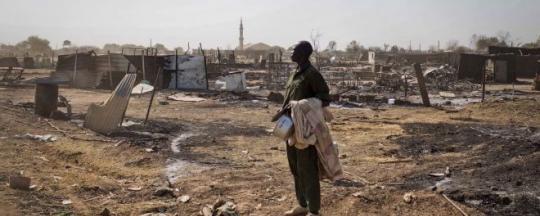Neither Truth Commissions nor Domestic Justice are Straightforward
Neither truth commissions nor domestic trials are as black and white as Professor Heller’s critique of my comments seems to argue.

First, Professor Heller is concerned that a post-war German truth commission would have meant that the architects of the Nazi period would have been absolved after “the Allies…simply asked them to admit their sins.” However, an examination of truth commissions established throughout the world attests that “truth commission” is not synonymous with “amnesty.” There are numerous potential models, with the South African TRC a leading example. The TRC had broad discretion to grant amnesties to those who appeared before it, but only if they offered a “full confession,” and the crimes about which they spoke were “politically motivated” and not a “gross violation of human rights.” And, of course, truth commissions can be run alongside trials — as in Sierra Leone, East Timor, and Argentina. There is no reason to think that a truth commission in conjunction with a judicial process would not have worked at Nuremberg. Transitional justice need not be either/or.
Professor Heller also argues that the focus of a post-World War II truth commission would necessarily have been on the top Nazis whose crimes were already documented in detail. Thus, he posits, the commission would “have accomplished precisely nothing,” because no truth would have been revealed. Truth commissions, however, have rarely been focused exclusively on leadership. Rather, commissions have usually taken testimony from those lower down in the state hierarchy or even outside the government — those co-workers and neighbors (“willing executioners,” if you will), whose crimes helped make larger crimes possible but whose own delicts may indeed be unknown. For victims and survivors, having these unknowns revealed is hardly “nothing.”
Regarding trials, Professor Heller posits that had the Allies insisted on domestic trials during the post-war period rather than on an international process, this would have meant that the Nazi justice system itself would have been called upon to dispense justice. However, to suggest that domestic trials might have been preferable in post-war Germany is not to argue that Goering et al ought to have tried themselves. Likewise, to suggest domestic trials in modern day Iraq was not an argument that Saddam and his cronies ought to have tried themselves. The “transition” in “transitional justice” refers to a transition in regimes, and it is the new regime that must come to terms with the old — how it goes about doing so (trials, truth commissions, lustration, etc.) is where the debate lies. Domestic trials in post-war Germany would thus have been those trials in which the justice process belonged primarily to the German people (rather than to the international community). This does not mean the international community would not have been involved, but it would have helped, not led, the process. Given that Germany was completely occupied after World War II (unlike after World War I), the room for Allied maneuver in this regard was essentially unbounded.
There are numerous possible models for such domestic trials, with varying levels and types of international assistance — the State Court of BiH, the Habré trial in Senegal, the Supreme Iraqi Criminal Tribunal (formerly the IST), and the IJP process in Kosovo are examples. True, in order to have worked, the Allies would have needed to find qualified Germans who were not a part of the Nazi machinery. While Professor Heller is correct that the judiciary and the wider bar in Nazi Germany had been co-opted into National Socialism, there were some potential sources. First, as in Iraq, Germany was not monolithic. In After Genocide: Bringing the Devil to Justice I discuss the Wehrmacht War Crimes Bureau which was well known as a refuge from the oppression of domestic Nazi politics. The Bureau’s personnel records reveal that it was home to a number of opponents to the Reich including: Johannes Goldsche (the Bureau’s long-time director), Helmuth James Graf von Moltke (the founder of the Kreisauer Kreis, a major anti-Hitler group), and Karl Sack and Rudolf Schleicher (who were both involved in the conspiracy to assassinate Hitler).
Jurists and prosecutors for domestic trials could have also potentially come from among the dozens of German legal scholars and practitioners who had been driven into exile by the Nazi regime. Jurists Uprooted by Beatson and Zimmermann provides a rich analysis of some of these individuals, many of whom were true giants in law: Georg Schwarzenberger, Otto Kahn-Freund, Kurt Lipstein, Hermann Mannheim, Gerhard Leibholz, F. A. Mann, among numerous others. Some like Mannheim had been judges in pre-Hitler Germany and may well have strongly desired to be involved.
Regardless, even if personnel could be found, it is safe to assume that if domestic trials had happened, they would have been far from perfect. But then, Nuremberg was also far from perfect. My book describes the limitations of Nuremberg and the more recent iterations of international criminal justice in detail. The question I pose in After Genocide is: in the wake of atrocities, what is the best of bad options? My answer is that domestic processes are for a host of reasons almost always “better” than international processes.
I agree with Professor Heller that there is a “cult of transitional justice,” much as there is a cult of international justice. I, however, do not think I am a part of either. Professor Heller seems to suggest, based upon a remark I made in the context of a much larger submission in a debate concerning my book, that I categorically support (“uncritically valorize”) non-penal transitional justice processes. This isn’t so. As is clear from my book, the work is actually about the potential for penal justice (not non-penal transitional justice) in post-atrocity situations. After Genocide‘s primary argument is that given that the international community has placed trials in a privileged position in dealing with mass crimes, such trials are not only better held in the country in which the crimes occur, but also that these trials can almost always be held in situ. And again, far from “uncritically valorizing” such proceedings, my only claim is that they are the best of bad options.
I admire Professor Heller’s appreciation for Nuremberg and even share some of his enthusiasm for it (as I note in After Genocide). I believe that it is likely that without Nuremberg, today’s international justice and transitional justice processes of all sorts (including domestic trials) would look quite different and/or perhaps be less robust. However, now that the limitations of Nuremberg are well known and the challenges of international justice in the modern era have become clear, what’s next? After Genocide argues that a closer focus on providing what survivors, victims, and societies directly impacted by mass crimes actually need “on the ground” — rather than on what the international community believes is needed — is the most propitious way forward.






